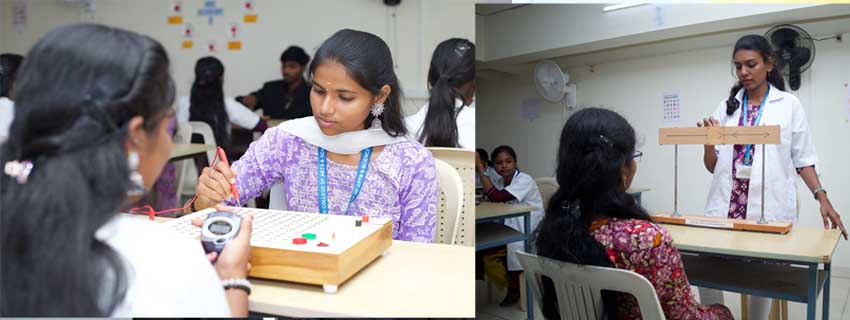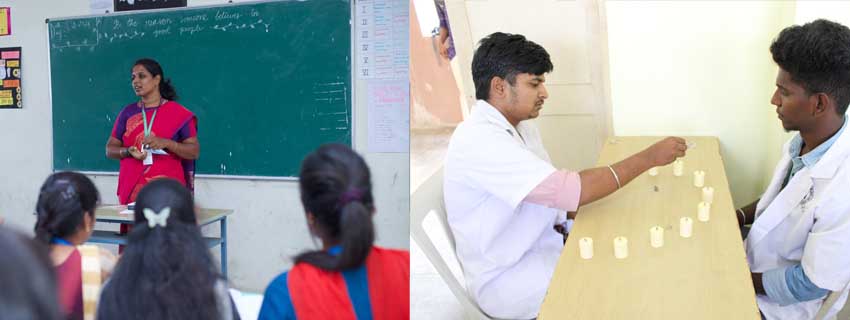Overview
The subject of psychology is both interesting and valuable. Psychology is the scientific study of human mind and behavior. It is a broad and diverse field with many career options for the students. This course forms the foundation for the students aspiring to specialize in various fields such as education, hospital, industrial, forensic, and many more. The key core areas of study in Psychology include general psychology, developmental psychology, social psychology, abnormal psychology and experimental psychology etc.,. This programme helps learner in building a solid foundation for higher studies in Psychology. In addition, students are equipped with skills that facilitate employment. It provides a basis for a better understanding of oneself and other members of society.
Welcome to the Department of Psychology, Mohamed Sathak College of Arts and Science, Sholinganallur, Chennai – 119.
The Department of Psychology was incepted in the year 2018 with the strength of 9 students and 2 faculty members. Now it has grown with a strength of 40 intake of students and adequate well - qualified teachers. The Department of Psychology has own library with 250 books for references and state of the art lab facilities for conducting experiments to acquire experiential knowledge. The department provides periodic practical exposure to students through Industrial Visits, Internships, Workshops, Seminars, Extension Activities, Outreach Programs, etc.,.
Highlights:
Industrial Visit – On February 9th 2024, the department celebrated World Mental Health Day, where the students promoted mental health awareness through posters, distribution of badges and discussions about the value of mental health to both teaching and non-teaching staff as well as other students.
Industrial Visit – On October 11th 2023 Industrial visit to the National Institute for Empowerment of Persons with Multiple Disabilities was organized by the department, where our department students gained practical knowledge about the diagnosis, treatment as well as facilities provided for people with multiple disabilities.
World Mental Health Day – On October 10th 2023, the department has organized and celebrated the World Mental Health Day, where the students promoted mental health awareness among college members through posters, distribution of badges and discussions about the value of mental health to both teaching and non-teaching staff as well as other students.
Youth Prevention on Tobacco Usage – On September 26th 2023a one-day seminar on “Youth Prevention on Tobacco Usage” was held by the Department of Psychology in an effort to raise awareness of the negative effects of tobacco use and strategies to prevent it.
Outreach Programme – On December 22nd 2021, an Outreach program on Woman Safety Issues was conducted at Perumbakkam Higher Secondary School.
Guest Lecture – On August 9th 2019 a Guest lecture was conducted on “Identifying a Dyslexic Child in a Normal Classroom” to raise awareness about the need for awareness among Parents, academicians and teachers.
Programme
Duration:
3 years (Regular)
No. of Semesters:
6 (Regular)
Eligibility:
Higher Secondary preferably Science Stream
Career Opportunities:
Scope for Higher Studies:
Vision
To promote high academic standards in psychology for both personal and professional development of the students.
To cultivate sympathy and empathy towards psychological aspects in dealing with everyday issues and gain theoretical and practical knowledge in emerging fields in psychology.
Mission
To develop a strong foundation in psychology and combined with practical knowledge.
To help young students recognize their strengths and to develop into successful psychologists, counselors and researchers.
To award the students on the basis of knowledge, understanding, skills, attitudes, values and academic achievements expected to be acquired by learners.
Highlights:
PEOs / PSOs / PO
Programme Educational Objectives (PEOs)
| PEO1. | To be able to critically evaluate and analyse theoretical perspectives and empirical findings that address psychology for developing new perspectives and contributing to the field of psychology. |
| PEO2. | To inculcate a sense of responsibility, authenticity and ethical values among students. |
| PEO3. | To develop professional skills, values, attitudes and behavior to facilitate academic excellence among students. |
Program Specific Outcomes (PSOs)
At the end of the programme, the student will be able to:
| PSO1. | DAcquire knowledge of key concepts and theoretical approaches and gain an understanding of the origin and recent advances in the discipline. |
| PSO2. | Think originally, and utilize the knowledge and understanding of Psychology to develop, appreciate and test the theoretical concepts for applications in various arenas |
| PSO3. | Assess and critically evaluate central ideas and assumptions comprehensively facilitating research and analysis of data. |
| PSO4. | To use relevant sources of scientific knowledge, to identify and generate novel solutions for problems for the enhancement of self and community. |
| PSO5. | The ability to effectively communicate learned information both in written and oral format. |
| PSO6. | To develop the capacity for individual and teamwork as well as to understand and implement the ethical principles necessary for professional upgradation |
Programme Outcomes (PO)
| PO1. | Promote and apply scientific knowledge for finding sustainable solutions to solve the issues about self and society. |
| PO2. | Identify, analyze and formulate novel ideas to yield substantial results in fields of research utilizing the principles of behavioral science. |
| PO3. | Relate key concepts and scientific principles to various scientific phenomena and their applications in day-to-day life. |
| PO4. | Use research-based knowledge and research methods including design of experiments, analysis and interpretation of data, and synthesis of the information to provide valid conclusions. |
| PO5. | Communicate ideas and suggestions effectively in English. |
| PO6. | Generate solutions for problems and design processes that meet the specific needs for appropriate consideration for physical and mental health, cultural, societal and environmental conditions. |
Programme
Duration:
3 years
No. of Semesters:
6
Career Opportunities:
Cruise line | Railways | Airlines | Aboard | Hotels & Resorts | Hospitals | Industrial Canteen
Faculty
Rank Holders
Department Of Psychology
-
Academic Year Student Name Rank 2019-2022 Deepak .T 4 2018-2021 Jegadev.S 3 2016-2019 Kishorkannan.S 3 2016-2019 Sourotu Santosh Kumar 5 2015-2018 Kunduru Sanjay Reddy 20 2014-2017 Syed Mohamed Fayaz.MAK 17 2014-2017 Zamsith Ahamed.S.T 66 2013-2016 Srinath.M 6





















